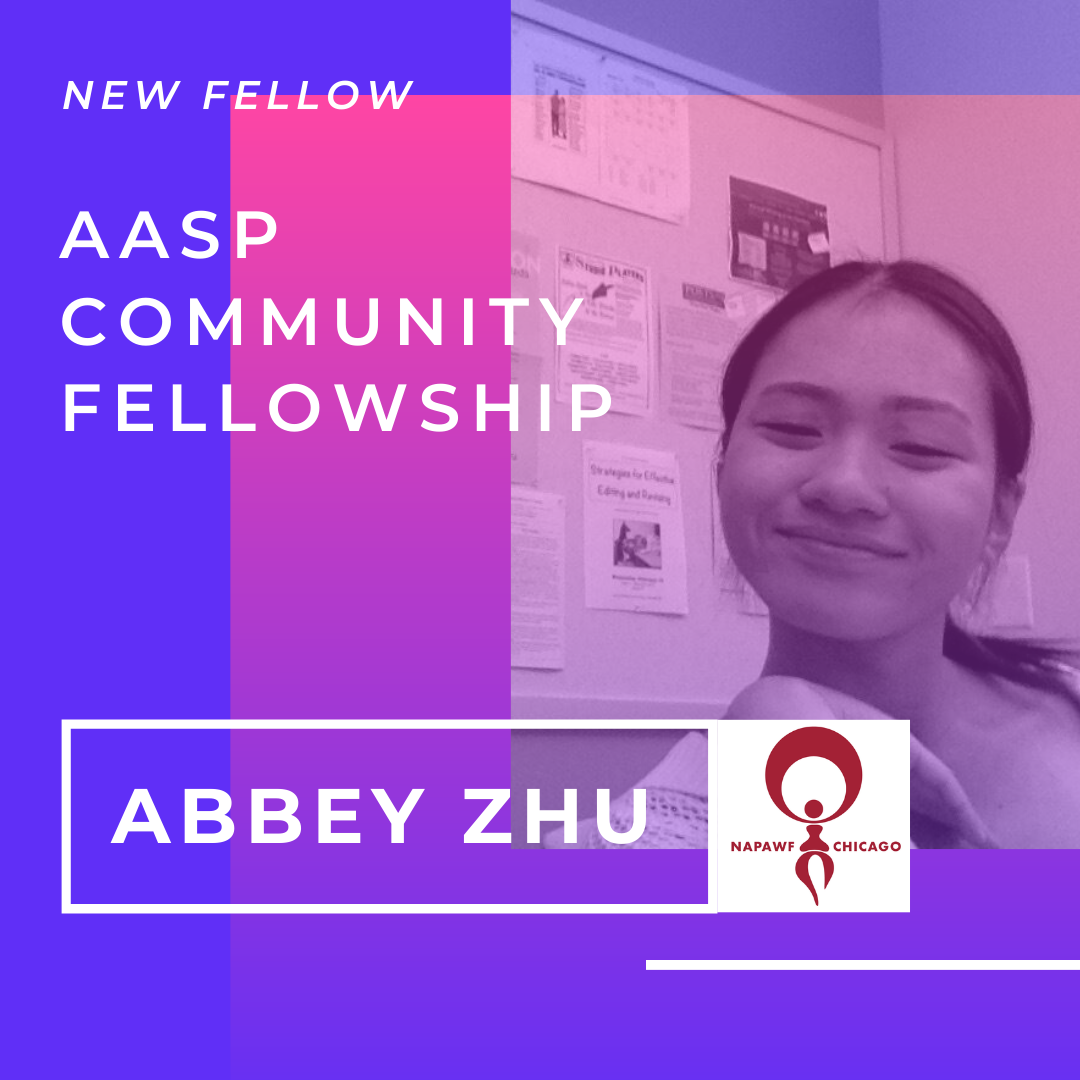Asian American Community Fellowship: Abbey Zhu
 Asian American Community Fellowship Reflection
Asian American Community Fellowship Reflection
By Abbey Zhu
Summer 2020
From July through August 2020, I had the privilege of interning with the Chicago chapter of the National Asian Pacific American Women’s Forum. NAPAWF is the only national organization building power with Asian/American and Pacific Islander women, girls, and nonbinary people for reproductive justice. NAPAWF is a multi-issue organization whose work lies at the intersections of racial justice, economic justice, and immigrant justice.
Prior to my internship, I had already been a member and leader of NAPAWF Chicago. After attending NAPAWF Chicago’s Reproductive Justice Leadership Institute throughout 2019, I became a member of our chapter’s leaders team. Along with another co-leader, I led NAPAWF Chicago’s federal advocacy working group beginning in January 2020. The chapter’s federal advocacy working group does campaign work around the HEAL Act, NAPAWF’s national-level campaign that all NAPAWF chapters are currently working on. The HEAL Act expands healthcare access to all immigrants regardless of their immigration status by removing the five year bar on Medicaid and CHIP; giving DACA recipients access to Medicaid, CHIP, and ACA marketplace exchanges; and giving all immigrants regardless of their immigration status access to the ACA marketplace. The federal advocacy working group strategizes around pushing our House Representatives and Senators to co-sponsor the HEAL Act. After being trained as a chapter leader through RJLI, participating in restructuring NAPAWF Chicago’s membership into working groups and organizing a leaders team, and co-leading the federal advocacy group, interning with NAPAWF Chicago felt like a natural transition into better understanding the roles of paid NAPAWF organizers, stepping up my leadership roles, and developing my community organizing skills.
My responsibilities while interning with NAPAWF Chicago ranged from attending meetings with other NAPAWF staff, to recruiting and having one on one meetings with new members, to phone banking in the Chinatown/Bridgeport area to talk to Mandarin-speaking aunties about COVID resources and the HEAL Act. Throughout the course of my internship, I attended weekly field staff meetings and weekly HEAL coalition meetings; had weekly one on one check-ins with Seri Lee, my supervisor; continued to lead the federal advocacy working group on strategizing for the HEAL campaign; represented NAPAWF at the Healthy Illinois coalition; led one on one meetings with new NAPAWF members; recruited new NAPAWF members; organized and facilitated agendas for the 2020 RJLI cohort; phone banked at least 5 hours a week for the HEAL Act and NAPAWF’s get out the vote campaign; created agendas for and participated in legislative meetings with House Representatives and Senators; organized a Twitter chat elevating the HEAL Act; and organized a social media campaign sharing the testimonies of NAPAWF members and impacted community members to emphasize the urgency and importance of passing the HEAL Act. Through organizing the Twitter chat in particular, I was able to reach out to and build relationships with other Asian American and Pacific Islander community organizations in Chicago who represented communities affected by HEAL. It was incredible to spend an hour on Twitter thinking through why passing HEAL is so urgent especially in light of the COVID-19 pandemic, who in our communities is most affected by inaccessible healthcare insurance prices, and why passing HEAL is imperative to materially supporting our communities’ lives and wellbeing.
Attending weekly field staff meetings allowed me to meet and build relationships with NAPAWF organizers in Georgia and New York. I got a better understanding of the administrative work they do, as well as questions they were thinking about in relation to their own chapters’ work. I was able to give advice to organizers about how to keep their members engaged, distribute work equally between paid organizers and chapter members, and give updates about how NAPAWF Chicago was organizing around the HEAL Act campaign. One of my favorite things to work on throughout the internship was creating and facilitating agendas for the 2020 RJLI cohort at NAPAWF Chicago. I worked alongside Seri and Zareen, the NAPAWF Chicago organizers, to put together trainings about power, building campaigns and identifying targets, neo-liberalism and Asian migration to the US, and the key concepts of reproductive justice. The most memorable training I led was on neo-liberalism and Asian migration to the US because I crafted most of the agenda. It was really gratifying to use the histories and concepts I’ve learned in Asian American Studies classes and apply that to leading comprehensive, accessible trainings for people who might never have learned these histories or thought about the importance of organizing work before. I am reminded of how important it is know and understand our histories in relation to other racialized, marginalized, and oppressed people’s histories to build intentional solidarity that will get us to imagining/materializing our collective liberation.
Interning with NAPAWF Chicago was a gratifying and enriching experience. I was so honored to be trusted with so many responsibilities and leadership roles, and I pushed myself to do my best work for an organization I consider my first political home. I will never forget the conversations I had with aunties living in Chinatown over the phone who told me about how difficult it was to apply for welfare assistance or other federal programs because of language barriers, or one auntie who told me that she could not understand the US healthcare system because in China, everyone had access to healthcare regardless of their income. She told me it was so clear that the US government didn’t care about its citizens or the people that lived within its borders. In our current neoliberal/settler colonial/ecological crisis, the urgency of building power within and across our communities is so apparent, and it is clear that we have what we need to take care of each other and fight for dignity and self-determination for all people. My experiences interning at NAPAWF Chicago solidified my commitment to continue serving my communities through organizing work for the rest of my life.
